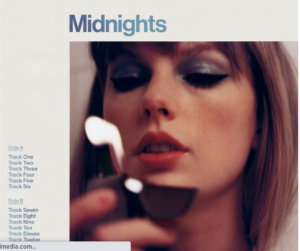Wait, is that a Hebrew letter on the cover of Taylor Swift’s new album?
Evidence suggests that the artist may have spent one too many ‘midnights’ studying numerology

Taylor Swift at the 2022 Toronto International Film Festival. Photo by Getty Images
Taylor Swift’s latest album, “Midnights,” was released last Friday, and within hours it set new records for the most album streams in a single day and the most-streamed artist in a single day, according to Spotify. What the album also did was set the internet ablaze with the search for the latest Swiftian “Easter eggs,” the term that has been applied to hidden and not-so-hidden messages that Swift buries in her song lyrics, videos and social media.
As Emily Yahr explained in The Washington Post, “On her path to becoming one of the most powerful stars on the planet, Swift has taken great joy in building her own mythology as she embeds clues, hints and puzzles into her music, social media posts and even seemingly offhand comments during interviews. Fans have been conditioned to think that everything could have a hidden meaning, whether she’s revealing a meaningful fact about her life or announcing the date of a tour, and they can work themselves into a frenzy trying to figure it out.”

One of the strangest theories to come out along these lines was a rhetorical question posed by Bryan Kirschen — a sociolinguist and associate professor at Binghamton University — on Twitter. Kirschen tweeted, “Anyone else think that the flame on @taylorswift13’s new album cover looks like the #Hebrew letter “yud”? Just found out it’s her 10th studio album, so maybe this isn’t a coincidence.”
The cover of “Midnights” features a close-up of Swift’s heavily made-up face (dark-blue eyeshadow and ruby-red lipstick, in keeping with the album’s “dark nights of the soul” theme). She’s holding up a lit cigarette lighter, the flame of which foregrounds her right cheek. As Kirschen points out, the shape of the flame bears a remarkable resemblance to the shape of the Hebrew letter “yud.” Hebrew letters have corresponding numerical values, and “yud,” as the 10th letter of the aleph-bet, means 10. And “Midnights” just so happens to be Swift’s 10th album.
Kirschen suggests maybe this is not a coincidence. And he has reason to wander down that Kabbalistic path. Swift has always acknowledged a fascination with numbers. You could even call her a numerologist. She has long had a fascination with the number 13; she once explained to TV talk show host Jay Leno that she was born on the 13th (Dec. 13, 1989), she turned 13 on Friday the 13th, her first album went gold in 13 weeks, and her first No. 1 hit had a 13-second intro.
She added that every time she won an award she was seated in the 13th row or row M — which she points out is the 13th letter of the English alphabet — and that when she won the Horizon award at the Country Music Awards, the producer came up to her and said, “We’re ready to go in 13 seconds.” She really impressed Leno when she told him she first played on “The Tonight Show” on February 13, 2007. And it certainly is not lost on fans that “Midnights” contains 13 songs, “the stories of 13 sleepless nights scattered throughout my life,” as Swift has described it.
So reading into the numerological import of the flame on the cover of her new album is precisely the sort of interpretive move Swift herself undertakes and encourages. As she told The Washington Post, “It’s really about turning new music into an event for my fans and trying to entertain them in playful, mischievous, clever ways.”
But how might have Swift — or her art director — known that “yud” equals 10? Well, maybe her longtime producer, Jack Antonoff, a New Jersey native who attended the Solomon Schechter Day School of Bergen County, had something to do with it.















